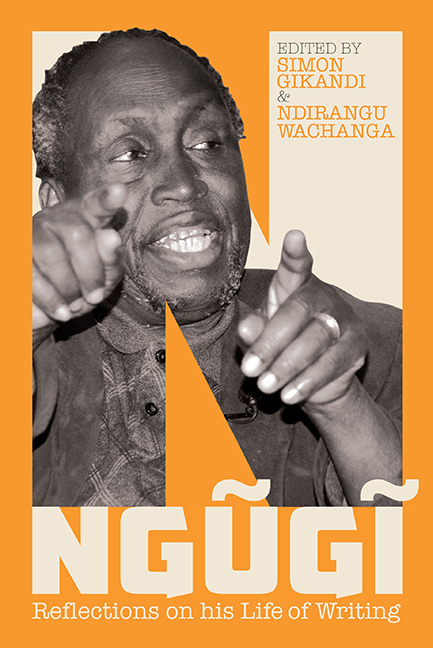Book contents
- Frontmatter
- Contents
- Preface
- Acknowledgements
- Chronology
- Photographic Section
- Introduction: Ngũgĩ wa Thiong'o: Reflections on His Life of Writing
- Ngũgĩ at Work
- Part I Serenades & Beginnings
- 1 Hyperbolic Praise Poetry for Ngũgĩ @80 … In Imitation of African Orature
- 2 A Song at Dawn (for Ngũgĩ wa Thiong'o)
- 3 Ngũgĩ in Eritrea
- 4 Up From Makerere: On the Publication of Weep Not, Child
- 5 Encountering Ngũgĩ at Leeds: An Interview with Peter Nazareth
- 6 The Book that Made Me: On Weep Not, Child
- 7 Note from a Literary Son
- 8 What is in a Name?
- 9 In Exile: Between Britain & Kenya
- Part II Memories, Recollections & Tributes
- Part III Working with Ngũgĩ
- Part IV The Writer, the Critic & the World
- Part V The Other Ngũgĩ
- Appendixes
- References
- Bibliography of Ngũgĩ's Primary Works
- Works Cited
- Notes on Contributors
- Index
5 - Encountering Ngũgĩ at Leeds: An Interview with Peter Nazareth
from Part I - Serenades & Beginnings
Published online by Cambridge University Press: 27 July 2019
- Frontmatter
- Contents
- Preface
- Acknowledgements
- Chronology
- Photographic Section
- Introduction: Ngũgĩ wa Thiong'o: Reflections on His Life of Writing
- Ngũgĩ at Work
- Part I Serenades & Beginnings
- 1 Hyperbolic Praise Poetry for Ngũgĩ @80 … In Imitation of African Orature
- 2 A Song at Dawn (for Ngũgĩ wa Thiong'o)
- 3 Ngũgĩ in Eritrea
- 4 Up From Makerere: On the Publication of Weep Not, Child
- 5 Encountering Ngũgĩ at Leeds: An Interview with Peter Nazareth
- 6 The Book that Made Me: On Weep Not, Child
- 7 Note from a Literary Son
- 8 What is in a Name?
- 9 In Exile: Between Britain & Kenya
- Part II Memories, Recollections & Tributes
- Part III Working with Ngũgĩ
- Part IV The Writer, the Critic & the World
- Part V The Other Ngũgĩ
- Appendixes
- References
- Bibliography of Ngũgĩ's Primary Works
- Works Cited
- Notes on Contributors
- Index
Summary
What was it like being in the same class with Ngũgĩ?
Being in the same class as Ngũgĩ was not a problem but a joy. Once I had graduated, I wanted to learn things by myself. I did not want to continue studying formally but to learn. That is why I went to teach at St Mary's College, Kisubi. One of the best ways of learning is by teaching. I was the first Asian to teach at St Mary's, as far as I know.
When Ngũgĩ and I attended classes together [at Leeds], we attended what at the University of Iowa are called ‘electives’, namely, courses we wanted to take. We both attended lectures by Arnold Kettle and also attended a seminar on the novel. Both of us thought that Kettle's courses were the best of the best. Kettle's two-volume book on the novel [An Introduction to the English Novel] was brilliant. Ngũgĩ was a very humble man and so knowledgeable. After the classes and the seminar, Ngũgĩ and I used to discuss what we had learned.
Did you know Ngũgĩ as a writer?
Ngũgĩ was a visionary, a political thinker, a person who keeps growing, who is persistent. It is not easy to be a novelist. And when everyone thinks you are done, you write a novel [Wizard of the Crow] of a thousand-plus pages (edited to seven hundred and sixty-eight pages), a novel which is funny and deep and readable. I taught the novel in my African literature class this Spring and students loved Ngũgĩ's novel. They did not find it difficult to read. The essay published on this novel, Wizard of the Crow, [in Approaches to Teaching the Works of Ngũgĩ wa Thiong'o] edited by Oliver Lovesey is by my former student, Steve Ellerhoff.
Ngũgĩ taught us how to pursue our visions without staying at one point. This is both strategy and growth. I said to Ngũgĩ when we met some years ago that ninety per cent of what I teach my students is what I taught myself. ‘That is the best way’, said Ngũgĩ.
Information
- Type
- Chapter
- Information
- NgugiReflections on his Life of Writing, pp. 45 - 47Publisher: Boydell & BrewerPrint publication year: 2018
